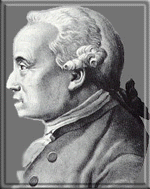
P1) Reason creates a moral obligation to attain the good.
P2) Obligation implies possibility.
P3) Attaining the good is only possible where moral order is an actual part of the universe.
C1) Therefore, it is possible to achieve the good.
P4) Humans are rational agents that do not actually achieve the good.
P5) There must be in some place, at some time, some being that achieves the good.
C2) Therefore, God is a rational agent that achieves the good (i.e., is happy to consistently fulfill the moral law).